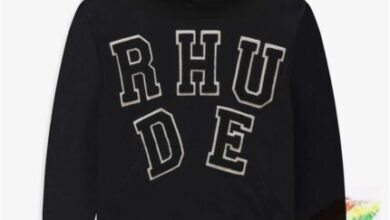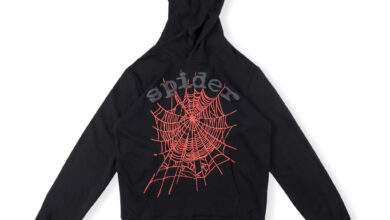Denim Tears: A Cultural Statement in Fashion

Denim has long been a symbol of American culture, worn by everyone from cowboys and miners to rebels and rockstars. Over the years, denim evolved from rugged workwear to a ubiquitous fashion staple, but few brands have managed to infuse this material with as much cultural resonance as Denim Tears. Founded by Tremaine Emory, Denim Tears is more than just a clothing line—it’s a platform for storytelling, a social commentary, and a celebration of African American history and resilience.
The Vision Behind Denim Tears
Tremaine Emory, the visionary behind the brand, launched Denim Tears in 2019 with a mission that extends far beyond fashion. Emory, a creative polymath with experience in various aspects of culture—ranging from fashion design to music collaborations—has made Denim Tears a brand that merges art, history, and activism. At its core, Denim Tears is a tribute to the African diaspora, using clothing as a canvas to tell stories that are often overlooked in mainstream narratives.
Denim Tears seeks to honor the contributions of African Americans to global culture and to shed light on their history, struggles, and triumphs. Emory’s designs are steeped in symbolism, often incorporating imagery and motifs that reference slavery, the Civil Rights Movement, and African spirituality. By merging these powerful messages with a distinctly modern aesthetic, Emory has created a brand that is both fashion-forward and historically conscious.
The Iconic Cotton Wreath Motif
One of the most recognizable symbols of Denim Tears Hoodie is the cotton wreath, a motif that features prominently in the brand’s denim jackets, jeans, and accessories. The cotton wreath serves as a stark reminder of the painful history of slavery in the United States, where enslaved Africans were forced to pick cotton on plantations, often under brutal conditions. However, Emory recontextualizes this imagery, using it not only as a symbol of suffering but also of resilience, survival, and cultural reclamation.
The wreath appears across various Denim Tears pieces, often screen-printed onto classic Levi’s jeans. The decision to collaborate with Levi’s, a quintessential American brand, is itself a symbolic gesture. Levi’s denim was originally popularized by miners and cowboys during the Gold Rush, groups that were integral to the shaping of America. By overlaying this iconic American fabric with a symbol of African American history, Emory highlights the often-ignored contributions of Black people to the nation’s development.
In a conversation with Interview Magazine, Emory said of the wreath: “It represents the blood, sweat, and tears of our ancestors… But it also represents our beauty, our strength.” This duality—pain and pride, suffering and beauty—lies at the heart of Denim Tears’ narrative.
Fashion as Protest
In the contemporary fashion landscape, where trends come and go at an accelerated pace, Denim Tears stands out by creating pieces that are not just stylish but also deeply political. Emory’s work has drawn comparisons to other trailblazing designers like Virgil Abloh and Kerby Jean-Raymond of Pyer Moss, who similarly use their platforms to challenge dominant narratives about race and identity in America. However, Emory’s work is perhaps more overtly focused on addressing historical injustices and amplifying the voices of marginalized communities.
Denim Tears’ collections are often released in conjunction with poignant political or cultural moments. For example, in the wake of George Floyd’s murder in 2020 and the subsequent Black Lives Matter protests, Emory used his platform to demand justice and encourage his audience to confront the legacy of systemic racism in America. This approach demonstrates that Denim Tears is not just a clothing line; it’s a form of protest, a way of raising awareness and fostering dialogue around issues that are crucial to Emory’s vision.
Fashion has always been a means of self-expression, but Denim Tears elevates this concept to a new level. Each piece is laden with historical and cultural significance, inviting the wearer to engage in a deeper conversation about race, identity, and the American experience. Whether it’s a denim jacket adorned with the cotton wreath or a T-shirt emblazoned with the words “African American College Alliance,” Denim Tears pieces function as wearable works of art that provoke thought and conversation.
Collaborations: Expanding the Conversation
A key aspect of Denim Tears’ success has been Emory’s ability to collaborate with other creative minds and brands. These collaborations allow Emory to broaden the scope of Denim Tears’ cultural impact while maintaining the brand’s core message. Some of his most notable collaborations include partnerships with brands like Levi’s, Converse, and UGG, as well as collaborations with cultural institutions like the Brooklyn Museum.
One of the most significant collaborations was the Denim Tears x Levi’s collection, which featured a limited-edition run of denim pieces printed with the cotton wreath motif. This collaboration was not just about aesthetics—it was a continuation of Emory’s mission to reclaim denim as a symbol of Black resistance and resilience. The collection was highly sought after, with pieces quickly selling out upon release, underscoring the cultural relevance and demand for fashion that speaks to larger societal issues.
Another impactful collaboration was with Converse. The Converse x Denim Tears Chuck 70 sneaker featured the cotton wreath print and was inspired by the idea of the African American experience as a foundational part of American culture. The partnership was part of Converse’s ongoing commitment to supporting creative voices from underrepresented communities, and it provided Emory with a larger platform to communicate his message to a global audience.
Emory has also ventured into the world of fine art with installations and exhibitions that expand upon the themes explored in Denim Tears’ clothing. In 2021, he collaborated with the Brooklyn Museum on a project that delved into the history of the cotton industry and its ties to slavery. The exhibition was part fashion presentation, part history lesson, with Denim Tears pieces displayed alongside historical artifacts that contextualized the brand’s cultural references.
Cultural Impact
Since its inception, Denim Tears Jacket has garnered attention from both the fashion elite and cultural commentators, making appearances in prestigious publications like Vogue, GQ, and The New York Times. Celebrities like Kanye West, Tyler, the Creator, and A$AP Rocky have been spotted wearing Denim Tears pieces, further cementing the brand’s status as a cultural touchstone.
But what truly sets Denim Tears apart from other streetwear brands is its commitment to using fashion as a tool for education and empowerment. Emory is not content to simply sell clothes—he wants to change the way people think about history, identity, and culture. By creating pieces that are rich in symbolism and rooted in the African American experience, Denim Tears encourages consumers to reflect on the past and consider how it shapes the present and future.
In an industry often criticized for its superficiality and focus on profit over substance, Denim Tears is a refreshing outlier. The brand’s success proves that there is a hunger for fashion that is meaningful, that tells a story, and that challenges the status quo. As Emory continues to push boundaries and expand the Denim Tears universe, one thing is clear: this is more than just a clothing brand. It’s a movement.
Conclusion
Denim Tears stands as a powerful example of how fashion can be used to tell stories, confront painful histories, and inspire meaningful change. By merging art, history, and activism, Tremaine Emory has created a brand that resonates on multiple levels, inviting wearers to engage with a deeper narrative about race, identity, and the American experience. Through the use of powerful symbols like the cotton wreath, Denim Tears serves as both a tribute to the resilience of African Americans and a call to action for future generations.
As the brand continues to evolve, its impact on fashion and culture will undoubtedly grow, cementing Denim Tears Tracksuit as a pioneering force in the industry and a vital voice in the ongoing conversation about race, history, and identity in America.





